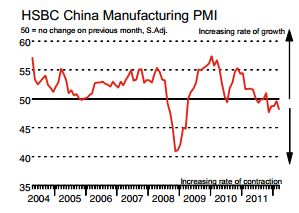Asian markets are down on mounting uncertainty among Spanish banks and political havoc in Greece. Additionally, unfavorable economic data from the US also led to rise in risk aversion in the global markets.
Moody’s Investors Service downgraded debt ratings of 16 Spanish banks mentioning a recession and increasing loan losses. Fitch Ratings cut Greece’s credit rating by one level on worries that the country might exit from the Euro Zone.
Fitch cut Greece’s rating to CCC from the previous B-. The ratings for Banco Santander SA and Banco Bilbao Vizcaya Argentaria SA, Spain’s biggest lenders, were downgraded by three notches by Moody’s.
US Unemployment Claims remained unchanged at 370,000 for the week ending on 11th May 2012. Philly Fed Manufacturing Index declined to the level of negative 5.8-mark in current month from previous rise of 8.5-level in last month. The Conference Board (CB) also declined by 0.1 percent in April compared to increase of 0.3 percent a month ago.
The US Dollar (DX) gained slightly by 0.1 percent in yesterday’s trading session as weak economic data from the US and deepening worries over Euro Zone debt crisis led to rise in risk aversion in the global markets. This boosted demand for low-yielding for dollar. The index touched an intra-day high of 81.83 and closed its trading session at 81.54 yesterday.
Growing concerns with respect to Euro Zone debt worries coupled with rising Greece and Spain tensions due to downgrading by Moody’s and Fitch exerted downside pressure on the Euro on Thursday.
Additionally, a stronger dollar and poor sentiments in the global markets also acted as a negative factor for the currency. The Euro touched an intra-day low of 1.2665 and closed at 1.2693 yesterday
Euro Dollar
EURUSD (1.2699) The euro continues to be weak, having lost just 0.2% since yesterday’s close. Natural support lies at the ytd low of 1.2624, which the market is attempting to test. A break below would open up a test down to the psychologically important 1.25. The fear is not Greece in itself, but the contagion impact of the threat to Italy and Spain combined with limited resources in the EFSF (€700bn) to contain these spillover impacts.
As well as mounting pressure on the ECB to enter more aggressive policy, to take weaker collateral and to blur the lines of a monetary but not a fiscal union. We have made no change to our year‐end forecast of 1.25, expecting EUR to trend lower under the weight of negative developments but that EUR averts a collapse as the US needs a weak USD; there is value in Germany, and repatriation flows remain positive for EUR and the US fiscal position
The Sterling Pound
GBPUSD (1.5934) Sterling hit a 1-1/2 month low versus the safe haven dollar on worries about Greece and fragility in the Spanish banking sector, with investors also bearish on the pound after the Bank of England cut UK growth forecasts. The pound also fell against the euro, which underperformed most other currencies as market players fretted over the risk that more euro debtor governments could be drawn deeper into the crisis.
Analysts said sterling could weaken further against the dollar after the BoE’s Inflation Report on Wednesday painted a gloomy outlook for the UK economy and left the door open for another round of asset buying.
Sterling tumbled 0.65 percent to a session trough of $1.5879, its lowest level since March 22, and the largest daily percentage fall in over a month. Selling accelerated on the break of the 100- and 200-day moving averages at $1.5826.
Asian –Pacific Currency
USDJPY (79.90) The JPY is flat vs the USD following the release of Q1 GDP figures. Japan’s economy expanded 1.0% q/q, slightly higher than expectations of 0.9% as the previous quarter saw upward revisions as well. Japan’s economic resilience in the midst of European turmoil, and its traditional role as a safe haven (given that the depth of its capital markets is matched only by that of the US), has allowed it to outperform all majors (save for the USD) so far this month, with an appreciation of 1.7% vs GBP and up to 6.0% vs SEK and NZD. This strength has not gone unnoticed by politicians such as the economic policy minister Furukawa, who has stated that the government maintains a desire to mitigate excessive appreciation. Finally, safe haven flows are also complicating the BoJ’s asset purchase plan, as the central bank failed to meet Wednesday’s asset purchase target. The failure of reaching the desired amount of purchases within the one to three year time‐frame may force the BoJ to reach farther out into longer dated maturities.
Gold
Gold (1572.15) Spot gold rebounded as buyers rushed to snatch bargains after prices plunged to 4½ month low and the Euro staged a rally. Euro inched up yesterday after falling to a four month low earlier as few Greek banks faced some emergency funding needs. Currently gold is trading in tandem with other riskier assets as investors turned to the US dollar and Euro hit multi month low levels.
Demand for physical gold is seen firm from Asian countries as traders hunted the low price advantage.
Crude Oil
Crude Oil (92.16) Oil traded near the lowest price in more than six months and was headed for its third weekly decline in New York on concern that demand will falter as Europe’s debt crisis worsens and the U.S. economy slows. Crude for June delivery was at $92.16 a barrel, down 32.cents.



